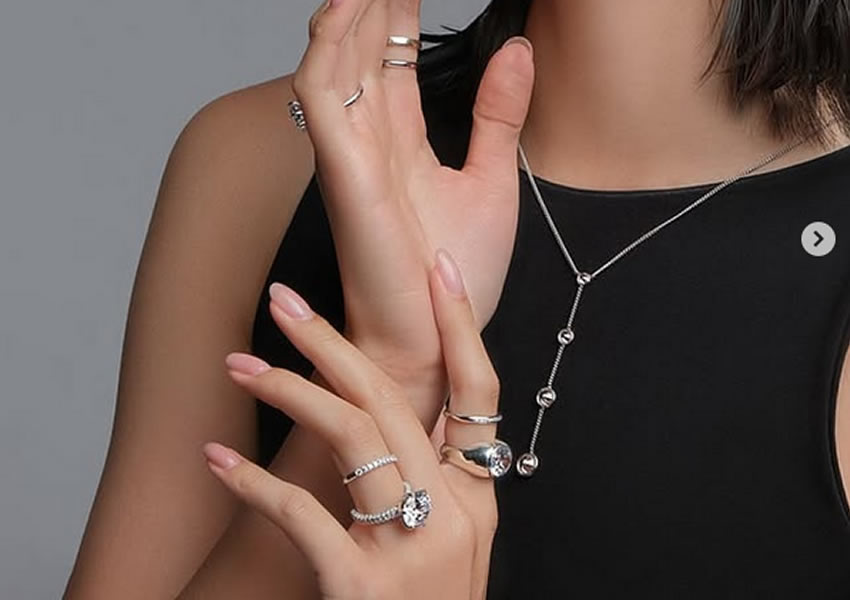A group of celebrity skincare experts have revealed how quarantine could be taking a serious toll on people’s complexions, while offering up advice on how to conquer a host of skin issues, from acne to dryness.
According to beauty pros, one of the most common quarantine complexion issues that they are seeing is an increase in breakouts and acne, with dermatologist and TLC star Dr. Sandra Lee – AKA Dr. Pimple Popper – explaining that the stress of self-isolation during a pandemic can show up in the form of bad blemishes.
Likewise, stress eating unhealthy foods while in quarantine can also cause a host of skin issues, particularly acne, with celebrity facialist Joanna Vargas, and author of recently-released skincare bible Glow From Within, warning that snacking on ‘garbage’ will likely result in some unwanted bumps and blemishes.
Here, the skincare pros reveal how to conquer the most common quarantine complexion issues – and detail how you can go about bringing your skin back to its best, without the help of a professional.

HOW WILL QUARANTINE AFFECT YOUR SKIN?
Breakouts
The most common side effect of quarantine as far as your skin is concerned is breakouts and acne, with skincare experts noting that this could be down to a number of causes, from increased stress and diet to a change in your regular routine – particularly if you are used to getting regular facials.
Stress can also aggravate acne, and cause serious flare-ups for anyone who has suffered from bad blemishes in the past – while even those with normally-clear skin may experience unwanted pimples and zits.
‘We know that stress induces the adrenal glands into overproduction of cortisol,’ celebrity esthetician Renee Rouleau explained.
‘This is a steroid that makes sebaceous glands produce more oil, making skin extra oily. Thus, in stressful periods, people experiencing an increase in acne get more inflamed, pus-filled papules than simple whiteheads or blackheads.’
Redness and sensitivity
Andrea Ani, esthetician and BABOR beauty expert, says that stress won’t only cause breakouts, but also redness, blotchiness, irritation and sensitivity, warning that ‘your current health, physical stress and lifestyle choices make up for 70 per cent of how skin ages’.
Dr. Eddie Omar of Phyto-C agrees, saying that ‘being indoors for extended periods of time can affect your mood which can ultimately show on your skin’ in the form of redness.
‘Studies have shown your skin tends to remain clear and radiant and appear healthy when you’re in a good mood,’ he shared, adding: ‘The opposite can result when you’re angry or mad and can turn skin red.’
Dryness
Dermatologist Dr. Patricia Wexler, the founder of Wexler Dermatology, explained that the increased frequency with which people are washing their hands during this time can cause severely dry skin, both on the hands and the face.
‘Due to this specific virus, people are consistently washing their hands and even their face, which could cause dryness and flakiness,’ she explained.
A flare-up of conditions like psoriasis and eczema
Dr. Omar says that heightened stress, which many people are currently experiencing, can lead to ‘flare-ups’ with conditions like rosacea or psoriasis.
New York-based Dr. Wexler agrees, explaining: ‘Due to this stress more cortisol is being produced by the body causing increased flares such as acne, psoriasis, and eczema for those prone to these problems, as well as hair loss, vitiligo and allergies.’
Dr. Lee added that these kinds of issues shouldn’t be ignored while you are in quarantine.
‘Conditions like hidradenitis suppurativa, severe psoriasis, acne, eczema, melanoma and aggressive squamous cell carcinomas need treatment sooner rather than later,’ she said while urging people to stay in touch with their regular dermatologist wherever possible.
WHAT CAN YOU DO TO TACKLE QUARANTINE COMPLEXION ISSUES?
Don’t slack on your normal skincare routine
Dr. Lee spoke directly to anyone who is nervous about touching their face to apply skincare products amid the pandemic, explaining that – while you shouldn’t touch your face when you are out in public – at home, it is totally safe, provided you have taken steps to keep your hands clean.
‘If you are out and about, and strangers are around you that are possibly infected, they can sneeze on your hands or even cough on objects that you touch, and if you bring your hand to your face with these respiratory droplets on it, you have a chance of getting coronavirus,’ she said.
‘If you are home and as far as you know, no one at home is infected, and you have washed your hands, you can touch your face. If you don’t have the respiratory droplets (spit, saliva) from someone else on your fingers who has coronavirus, you can’t get it!’
With this in mind, Dr. Lee stressed how important it is to ‘care for your skin as you normally would’, adding: ‘If you don’t care for your skin, skin conditions can begin to brew, or existing skin conditions can worsen.’
Renee agreed while warning people not to get ‘lazy’ with their skincare routines – particularly when it comes to washing your face.
She said: ‘The lounging around can make people feel lazier so as an example, they could skip washing their face at night — especially if they are in the mindset of, “I’m not wearing any makeup so why should I have to wash my face at night?”
‘Especially for those who produce oil and are prone to clogged pores, bumps and breakouts, this will negatively impact the skin by increasing the chances of getting these.’
Treat yourself to skincare ‘extras’ like regular face masks or an at-home peel
One of the great benefits of spending so much time is home is that you have plenty of opportunities to treat yourself to all of those skin treatments that you might not normally have time to do, whether that’s face masks or an at-home peel.
Joanna says that ‘proper exfoliation and sheet masks’ are a ‘great way to have a spa-like facial right at home’, while Renee added: ‘Just like anything in life, the more attention you give to something, the better results you should gain.
‘I would suggest taking the time out to do the “extras” that your normal, busy life doesn’t always make time for. This would include an at-home peel like the Renee Rouleau Triple Berry Smoothing Peel followed by a mask for your skin type.’
She noted that being isolated and socially distanced is a great time to try out treatments like a peel that normally require a bit of downtime.
Test out lymphatic drainage
Whether or not you are used to getting regular facials, there is no denying the benefits of facial massage, which Joanna says can work wonders for the skin, particularly if you learn lymphatic drainage.
‘Lymphatic drainage massages are a lost art and certainly an at-home treatment that anyone can use to make the face look rejuvenated,’ she explained.
‘For dry skin, massage the skin in circular motions upward. Start at the base of the neck on the sides where your arteries are. Massage in gentle circles upwards, towards the jaw, up the sides of the face and around the eyes. This will help coax nutrients into the tissue.
‘You want to do the opposite motion and start on the top of the face by the eyes if you are prone to breakouts – this will draw the waste away.’
Wear SPF even if you’re inside all-day
Even if you are self-isolating in a tiny apartment with very few windows, SPF is essential in order to protect your skin.
‘The biggest misconception about the sun is that the only way that you’re getting damage is when you’re out in direct sunlight during the hot summer months,’ Renee said.
‘At any point from sunrise to sunset all year round, the sun gives off daylight. Even if it’s pouring rain, snowing or cloudy, daylight can still be found. If you are inside and can see through any windows to the outside world, then daylight is absolutely coming in and seeing you—and your precious skin.’
Those rays, Renee warns, can cause ‘premature skin aging and skin cancer’, and their strength remains the same throughout the year – as did their ability to ‘penetrate through clouds and windows’.
‘These are the true damaging rays because you can’t feel them yet they are affecting your skin in a big way without you even realizing it, Renee added.
‘This is why sunscreen should truly be called daylight screen. Every time daylight shines on your skin, it accelerates the aging process of your skin.’
Protect your skin from screens
Dr. Omar warns that UVA rays aren’t the only light you need to worry about when it comes to your skin – you also need to be wary about blue light from screens.
‘While people will be spending more time in front of their phones, computer screens, and exposing their skin to more blue light, it is more important than ever to apply antioxidants such as Vitamin C and Vitamin E that will help protect their skin from free radical damage caused by blue light.’
Try and get outside at least once a day
Spending so much time cooped up inside could leave you suffering from a vitamin D deficiency, which can cause a flare-up of conditions like acne and psoriasis.
‘I know in general we dermatologists don’t usually recommend sun exposure because of the risk for skin cancer but know that desperate times mean desperate measures,’ Dr. Lee explained.
‘Sunlight is actually a mild anti-inflammatory and exposure to sun while increasing your risk for premature aging and skin cancer, can also to some degree improve your acne, psoriasis and eczema in the short term, while you are awaiting that medication refill.’
Dr. Omar added: ‘Vitamin D is made from cholesterol in your skin when it’s exposed to the sun, specifically UVB rays. Unsurprisingly, this means sunlight is extremely important for maintaining optimal vitamin D levels.’
Just make sure, Dr. Wexler notes, that you wear SPF when you go outside. Provided you do, getting a daily 15 minutes of sun exposure could work wonders for your skin. But, if getting outside isn’t an option for you, there are alternatives.
‘During this time it would be good to get at least 15 minutes of sun exposure while wearing SPF, but if you are unable, there are skincare products formulated with Vitamin D to use as an alternative,’ she said.
Work on reducing your stress
Stress is likely to be one of the main causes for any skin flare-ups that you might experience during quarantine, do in addition to using products to calm those issues down, working on managing those feelings can also have a huge impact on your complexion.
‘I think during this time inside, we can take the opportunity to practice self-care both physically and mentally,’ Dr. Wexler said.
‘When feeling stressed people tend to forget their routine and eliminate steps or stray away, so during this time we can be extra proactive about our daily routine: taking the time to cleanse, exfoliate, moisturize, treat, apply face masks and more.’
Dr. Lee – who recommended her pimple popping videos to all those who need to take their minds off the pandemic – added that your skin will reflect what your body is feeling, so it’s important to look after yourself physically and mentally during this time.
‘Lifestyle wise, we can now take the time to focus on what our mind and body needs, like proper rest, it is very important to get 7 hours of sleep, eat nutritious foods and some form of daily exercise, like short walks around your block or within your building, yoga and more,’ she explained.
Think about your quarantine diet
As Joanna pointed out, eating ‘garbage’ while in lockdown will take a serious toll on your complexion, so it’s important to make sure that you maintain a healthy diet, and don’t get tempted to eat junk out of boredom.
‘Now is the most important time to ensure you maintain a healthy immune system,’ BABOR expert Andrea added.
‘If you are feeding your system with junk food, then you will get junk results. Fill it up with the proper fuel and you will feel and look better! Again, do the research online now that you have the time.’
Susan Piergeorge, MS, RDN, Nutrition Education Manager, for NeoCell, added that the temptation to fall into any kind of unhealthy habits during this time – from food to lack of exercise – will cause serious skin issues.
‘Eat well, rest, exercise when possible and practice personal methods of stress management,’ she said.
Stay in touch with your dermatologist
While staying indoors and taking care of yourself is more important than ever, that doesn’t mean that you should stop communicating with healthcare professionals – from a safe social distance – particularly if you suffer from a severe condition that needs special care.
Dr Lee advised that certain conditions, including hidradenitis suppurativa, severe psoriasis, acne, eczema, melanoma and aggressive squamous cell carcinomas, ‘need treatment sooner rather than later’ so if you can continue to seek help and treatment from your healthcare professionals then you should.
‘These issues can’t wait for this social distancing decree to be lifted,’ she said. ‘If you have any of these conditions that need regular monitoring or treatment by a dermatologist, please know that many of us are still working!
‘This is important because we don’t want these patients to find themselves desperate and in the emergency room taking up beds and time from physicians and staff who need to devote their efforts to save the lives of people with active coronavirus infections. Also, there are telehealth options now too (doctor appointments via video) – you can speak to your dermatologist via FaceTime.’
How to create a spa day at home during the quarantine
A day SPA in Christchurch (New Zealand) advice for home SPA: Set the tone for your room and your bathroom to emulate the experience, turn on your shower on the highest setting to create a sauna-like feeling, grab your favourite candles, and dim the lights.





